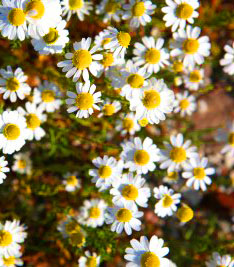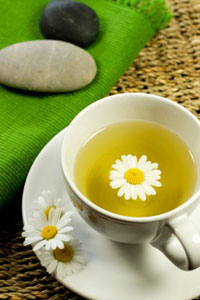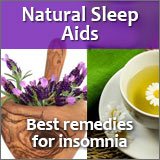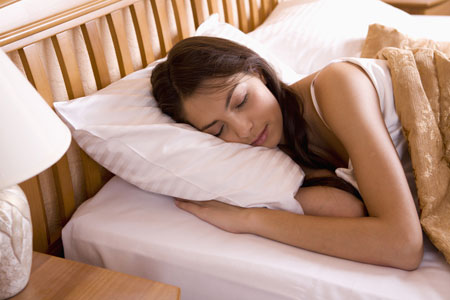With This Herb, You Now Have Six Top Herbal Sleep Remedies to Choose From
Chamomile is often mentioned as one of the herbal sleep remedies. I've investigated the scientific literature and there aren't a lot of studies to support this.

Nevertheless, as you're about to discover, the studies that are there make this herb a welcome addition to the other five insomnia herbal remedies I've already written about (see below).
Also, because most of the research out there has been done on German chamomile (scientific name matricaria recutita), that's what this article focuses on.
And one final point about studies on herbal sleep remedies. Yes, studies are important. And I do believe in being cautious with herbal products, especially for people taking certain prescription medications.
However, if we all waited around for "absolute proof" from a bunch of studies on herbs to be done before we ever used them, we'd all be dead by the time that happened. Then none of us would ever have had the benefit of what these alternative herbal treatments can do for us.
Fortunately, chamomile is one of those herbs that's been safely used as a folk medicine for thousands of years for a wide variety of ailments.
Chamomile benefits include using it for stomach upset, intestinal gas, anxiety and worry, muscle spasms, healing wounds, and as one of the herbal sleep remedies for insomnia. It also happens to be one of the most widely consumed herbs worldwide.
So let's look at some studies
One study reported in Planta Medica, one of the top journals in the area of medicinal plants, showed that chamomile flowers contain a compound called apigenin. It exerts an anti-anxiety and slightly sedative effect.
The May 2005 journal, Biological and Pharmaceutical Bulletin, showed that chamomile exerted a significant decrease in sleep latency. That means that chamomile reduced the time it takes to fall asleep. (By the way, this was a study using sleep-disturbed rats. What do you suppose a rat with insomnia worries about?)
Anyway, the study concluded that chamomile was an herb that had sedative-like, sleep inducing activity.
Anxiety and worry can cause insomnia
If you ever have trouble falling asleep because your mind is dizzy with stress and anxiety...and if you don't like the idea of taking prescription drugs for anxiety because of their side effects...then chamomile just may be one of the natural remedies for insomnia you're looking for.
In a well-designed study at the University of Pennsylvania, researchers split 57 patients diagnosed with generalized anxiety disorder into two groups. One group received a placebo (fake pill) and the other received capsules containing chamomile. After two months, the group taking chamomile had fewer symptoms of anxiety. (Journal of Clinical Psychopharmacology. 2009;29(4):378-382).
More health benefits of chamomile
Another reason chamomile may be one of the effective herbal sleep remedies is because of its ability to sooth the nervous system and the digestive system. I've been drinking chamomile tea for decades and I know that nothing has ever worked as well for me for an upset stomach. And for a pleasant tasting tea that packs a gentle but effective one-two punch for stomach ache or intestinal gas, try chamomile together with peppermint in a tea.
Here's another sleeping recommendation
It's important to have some sort of bedtime sleep routine so you signal your body and mind to get ready for bed. The ritual of having a cup of chamomile tea about an hour before bedtime invites a relaxing calm at the end of the day.
Techniques for making use of chamomile

The easiest way to get started is to make an herbal tea. Steep 1/2 to 3 teaspoons of dried chamomile flowers in one cup of boiling water. Steep for 10 minutes. I personally prefer the tea bags.
You can drink several cups a day (1 to 4) but you may want a smaller cup closer to bedtime so a full bladder doesn't wake you up in the middle of the night.
And here's another little tip I learned from Dr. Andrew Weil when I was co-writing and editing Simple, Natural Solutions for Better Sleep (published by Weil Lifestyle). To prevent loss of the volatile oils in the chamomile steam, keep the tea covered while steeping.
A tincture of chamomile works too to promote good health. Check with your local health food store.
There are also chamomile capsules available. And the chamomile
may come in a formula with other herbs such as valerian or
passionflower.
For example, Neuro-Natural Sleep is one of the best sleep supplements in the world today. This natural formula contains chamomile, valerian, passionflower, and 46 other nutrients. Click here to see this amazing natural sleep aid at Amazon.
Safe use of chamomile
German chamomile has GRAS (Generally Recognized As Safe) status from the U.S Food and Drug Administration. The reported cautions about chamomile most often refer to those people who are allergic to plants in the daisy family (ragweed, chrysanthemums, marigolds, and daisies). So if that's you, it will certainly be necessary to use caution.
Also, the drowsiness and sedating effects of chamomile may be increased when combined with other herbal supplements.
One final thought on herbal sleep remedies containing chamomile:
Chamomile does contain coumarin, an anticoagulant (stops blood from clotting). So use caution if you're taking anticoagulant medications like warfarin.
Other than these cautions, millions of people around the globe use this wonderful herb every day because it's such a soothing remedy.
But there's really no way of knowing how chamomile will work for
you as one of the herbal sleep remedies until you try it. And if
chamomile isn't your cup of tea, at least you have the many other
natural sleep aids below. Enjoy!
Continue Reading With These Helpful Articles
Part 1: How to Use Herbal Sleep Aids as Herbal Remedies for Insomnia
Part 2: More Herbal Remedies for Insomnia...Turn Off Your Mind
Part 3: Herbs for Sleep--Hops
Part 4: Sleep Aid Herbs--Secrets To Sleeping Well Using Passionflower
Part 5: An Herbal Sleep Remedy for Egyptian Mummies?
Return From Top Herbal Sleep Remedies To Sleep Passport Homepage








